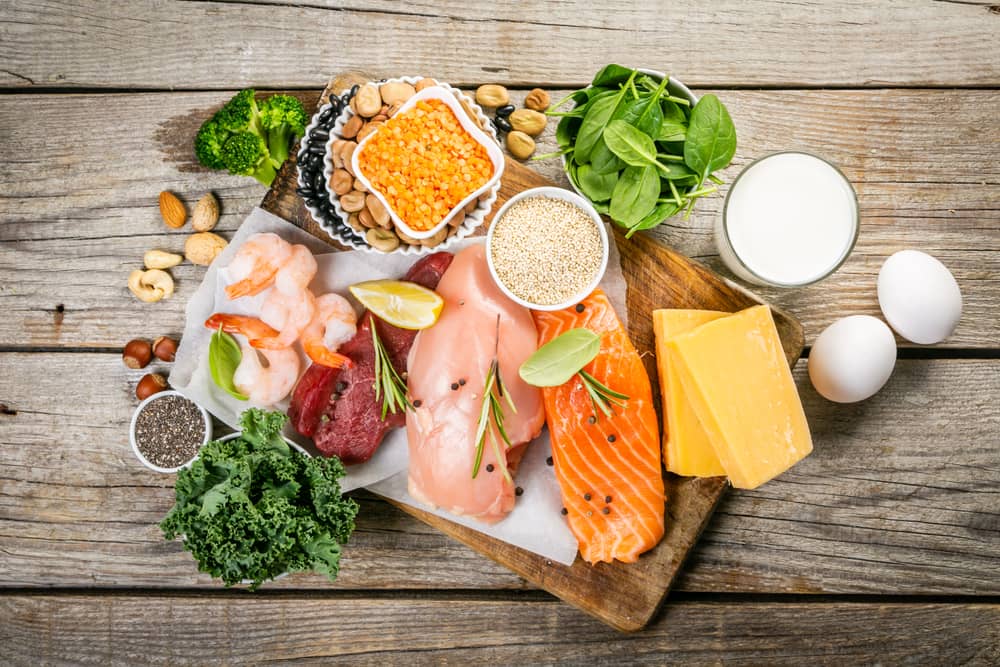Diet & Nutrition for Adults with Advanced Chronic Kidney Disease
On this page:
- Why are diet and nutrition important for adults with advanced chronic kidney disease?
- What is medical nutrition therapy?
- Why is knowing about calories important?
- Why is knowing about protein important?
- Why is knowing about fat important?
- Why is knowing about sodium important?
- Why is knowing about potassium important?
- Why is knowing about phosphorus important?
- Why is keeping track of how much liquid I consume important?
- How can understanding and keeping track of lab reports help me make healthy food choices?
- Clinical Trials for Adults with Advanced CKD
Why are diet and nutrition important for adults with advanced chronic kidney disease?
Healthy kidneys balance salts and minerals in the blood. When you have chronic kidney disease (CKD), the kidneys can’t filter your blood the way they should. What you eat and drink can help your kidneys maintain a healthy balance of salts and minerals in your body and help you feel better.
Eating the right foods—and avoiding foods high in sodium, potassium, and phosphorus—may prevent or delay some health problems from CKD. What you eat and drink may also affect how well your kidney disease treatments work. Understanding how calories, fats, protein, and liquids affect the body is important for people with advanced CKD.
As CKD advances, nutritional needs change. Your health care professional may recommend you choose foods more carefully and may suggest you work with a registered dietitian to create an eating plan for your individual needs.
What is medical nutrition therapy?
Medical nutrition therapy (MNT) is nutrition counseling from a registered dietitian to help meet your medical or health goals. MNT can help delay CKD progression, prevent or treat complications, and improve your quality of life.
Dietitians who specialize in the nutritional needs of people with CKD are called renal dietitians. You can find a registered dietitian who specializes in kidney disease through the Academy of Nutrition and Dietetics online or through your health care professional.
 Work with a renal dietitian to create a healthy meal plan that’s right for you.
Work with a renal dietitian to create a healthy meal plan that’s right for you.Why is knowing about calories important?
The foods and beverages you eat and drink give your body energy. The energy is measured in calories. If you consume fewer calories than your body uses, you may lose weight. Losing too much weight can make you sicker.
People with CKD may avoid eating because they don’t feel hungry or because foods or beverages don’t taste the same. If you find that you don’t feel like eating, talk with a dietitian or health care professional to make sure you are getting enough calories and that the calories are from nutritious sources. Your dietitian or health care professional can help you find healthy ways to get the right number of calories in your diet.
Why is knowing about protein important?
Protein helps build and maintain muscle, bone, skin, connective tissue, internal organs, and blood. Protein also helps fight disease and heal wounds. As your body uses protein, the protein breaks down into waste that your kidneys must remove from the blood.
Health care professionals recommend that people with CKD consume moderate amounts of protein. However, too little protein may lead to malnutrition, a condition that occurs when your body doesn’t get enough nutrients. A dietitian can help you learn about and adjust the amount and sources of protein in your diet.
Sources of protein
The typical American diet contains more than enough protein. Protein is found in both animal and plant-based foods. Animal protein contains more essential nutrients a body needs. However, with careful meal planning, a well-balanced vegetarian diet can also provide these nutrients.1
Learn more about protein and serving sizes in Protein: Tips for People with Chronic Kidney Disease (CKD) (PDF, 1.15 MB) .
Talk with a dietitian or health care professional about how much protein is in your eating plan and where the protein comes from. Your protein needs may change over time. A dietitian or health care professional can suggest dietary changes to help you meet your protein needs.
 Protein is in many foods you eat, including foods from plants and animals. Ask your dietitian or health care professional which sources of protein are right for you.
Protein is in many foods you eat, including foods from plants and animals. Ask your dietitian or health care professional which sources of protein are right for you.People on dialysis
People with CKD who are on dialysis may need to eat more protein because the dialysis treatment removes protein from the blood. The amount of protein removed from the blood depends on the type of dialysis treatment.
Why is knowing about fat important?
Fat gives your body energy, helps control your cholesterol and blood pressure levels, and helps your body absorb vitamins. Fat also provides essential nutrients and is an important part of a healthy eating plan.
Everyone needs some fat in their diet, but too much fat or the wrong kinds of fat may cause buildup in your blood vessels, heart, and kidneys. People with CKD are at higher risk of heart disease and should limit the amount of fat they consume. Monounsaturated fats and polyunsaturated fats—found in foods such as canola oil, corn oil, peanut oil, and safflower oil—are healthy alternatives to saturated fats and trans fats. Saturated fats and trans fats can raise cholesterol levels and clog blood vessels. Saturated fats, which are found in animal products such as red meat, poultry, and butter, are usually solid at room temperature. Trans fats are often found in baked goods and fried foods, as well as in hydrogenated vegetable oils such as margarine and vegetable shortening.
You may protect your heart health and reduce your chance of getting heart disease by replacing saturated fats and trans fats in your diet with healthier monounsaturated and polyunsaturated fats. Talk with a dietitian or health care professional about healthy ways you can include fat in your diet.
Sources of fat
Eat these foods less often
- saturated fats
- butter
- lard
- red meat
- whole milk
- trans fats
- commercially baked goods, such as cookies and cakes
- doughnuts
- french fries
- hydrogenated vegetable oils
- margarine
- shortening
Eat these foods more often
- monounsaturated and polyunsaturated fats
- canola oil
- nuts
- oatmeal
- olive oil
- salmon
- sesame oil
Why is knowing about sodium important?
Sodium is a mineral found in salt that helps control the amount of fluids in your body. Too much sodium causes your blood to retain—or hold on to—fluids, which can cause high blood pressure and swelling, putting stress on your kidneys and heart.
The U.S. Food and Drug Administration recommends that adults limit their sodium intake to no more than 2,300 mg per day. However, your health care professional or dietitian can help you determine how much sodium is right for you, based on your stage of kidney disease and your health status. They can also help you find ways to reduce the amount of sodium in your diet.
Much of the sodium that Americans consume comes from processed foods. The amount of sodium in foods and beverages can be found on the product’s Nutrition Facts label. Canned foods, some frozen foods, and most processed meats contain large amounts of salt. Snack foods such as chips and crackers are also high in salt. Table salt, some seasonings, and certain sauces such as soy sauce and teriyaki are high in sodium.
You can lower the amount of sodium in your diet by
- eating fresh, frozen (without sauce or seasoning), or canned (low sodium or no salt added) fruits and vegetables
- choosing unprocessed meats instead of processed meats
- cooking from scratch
- using spices, herbs, and salt-free seasonings instead of salt
- using alternative seasonings, such as lemon juice and hot pepper sauce
- looking for products labeled “sodium free” or “low sodium”
- draining and rinsing canned foods to remove extra salt
- limiting the amount of packaged, processed, and fast foods you eat
People with CKD should avoid using salt substitutes that contain potassium, because kidney disease makes it harder for the body to remove potassium from the blood. Learn more about which foods are high and low in sodium and about sodium alternatives in Sodium: Tips for People with Chronic Kidney Disease (CKD) (PDF, 564.32 KB) .
 Lower the amount of sodium in your diet by learning to cook meals using fresh, unprocessed ingredients, and limiting the amount of packaged and fast foods you eat.
Lower the amount of sodium in your diet by learning to cook meals using fresh, unprocessed ingredients, and limiting the amount of packaged and fast foods you eat.Why is knowing about potassium important?
CKD can make it harder for the kidneys to remove potassium from the blood, and the levels of potassium in the blood can become very high. Too little or too much potassium can cause heart and muscle problems. People with CKD should have their blood checked regularly to make sure their potassium levels are normal.
Your food and drink choices can affect your potassium levels. Talk with a dietitian or health care professional about how much potassium you should have for your stage of kidney disease.
You can lower the amount of potassium in your diet by
- selecting fruits and vegetables that are lower in potassium
- draining canned fruits and vegetables and throwing out the liquid, which is often high in potassium
- using spices and herbs instead of salt substitutes, which can be very high in potassium
- talking with a dietitian or health care professional about food preparation and cooking methods that can lower the amount of potassium in potatoes and certain vegetables
Learn more about which foods contain potassium in Potassium: Tips for People with Chronic Kidney Disease (CKD) (PDF, 210.54 KB) .
Why is knowing about phosphorus important?
Damaged kidneys aren’t able to remove phosphorus from the blood as well as healthy kidneys. Phosphorus can build up in the blood in people with CKD. Too much phosphorus can weaken your bones.
Phosphorus is found naturally in foods rich in protein. Phosphorus is also added to many processed foods, flavored drinks, and some meats. Phosphorus additives are a primary source of phosphorus for many people with CKD. Foods that have added phosphorus may cause your blood phosphorus levels to go up more than foods that have phosphorus naturally. A dietitian or health care professional can help you find ways to get enough protein without getting too much phosphorus.
Learn more about which foods are higher or lower in phosphorus in Phosphorus: Tips for People with Chronic Kidney Disease (CKD) (PDF, 914.53 KB) .
As kidney disease gets worse, you may need to take a phosphate binder with meals to lower the amount of phosphorus in your blood. A phosphate binder is a medicine that acts like a sponge to soak up, or bind, phosphorus while it is in the stomach. Because it is bound, the phosphorus does not get into your blood. Instead, your body removes the phosphorus through your stool.
Why is keeping track of how much liquid I consume important?
Your body needs liquids to function properly. However, people with advanced CKD may need to limit how much liquid they consume because damaged kidneys can’t remove extra fluid. Taking in too much liquid can cause swelling, raise your blood pressure, and make your heart work harder. Consuming too much liquid may be a sign that you are taking in too much sodium.
A dietitian or health care professional can work with you to determine how much liquid is right for you. Contact your health care professional if you notice any swelling in your face, arms, legs, or abdomen.
How can understanding and keeping track of lab reports help me make healthy food choices?
Your health care professional will order regular blood tests to track your health. You may need to make changes to what you eat and drink based on the blood test results. You may find that keeping track of test results (PDF, 526.91 KB) helps you see how well you are doing. You can ask your health care professional for copies of your lab reports and to explain them to you. Learning how to read your lab reports will help you see how the foods you eat and beverages you drink can affect your health.
Clinical Trials for Adults with Advanced CKD
The NIDDK conducts and supports clinical trials in many diseases and conditions, including kidney disease. The trials look to find new ways to prevent, detect, or treat disease and improve quality of life.
What are clinical trials for adults with advanced CKD?
Clinical trials—and other types of clinical studies—are part of medical research and involve people like you. When you volunteer to take part in a clinical study, you help health care professionals and researchers learn more about disease and improve health care for people in the future.
Researchers are studying many aspects of advanced CKD, such as
- adjustments to the CKD diet to improve clinical management of the disease
- treatments to reduce the loss of muscle mass and function in CKD patients
- the effect of nutritional coaching on kidney disease progression
Find out if clinical studies are right for you.
Watch a video of NIDDK Director Dr. Griffin P. Rodgers explaining the importance of participating in clinical trials.
What clinical studies for CKD are looking for participants?
You can view a filtered list of clinical studies on chronic kidney disease that are open and recruiting at ClinicalTrials.gov. You can expand or narrow the list to include clinical studies from industry, universities, and individuals; however, the National Institutes of Health does not review these studies and cannot ensure they are safe. Always talk with your health care provider before you participate in a clinical study.
Reference
This content is provided as a service of the National Institute of Diabetes and Digestive and Kidney Diseases
(NIDDK), part of the National Institutes of Health. NIDDK translates and disseminates research findings to increase knowledge and understanding about health and disease among patients, health professionals, and the public. Content produced by NIDDK is carefully reviewed by NIDDK scientists and other experts.
The NIDDK would like to thank:
Lois Hill, M.S., RDN, LD, LDE, Academy of Nutrition and Dietetics

